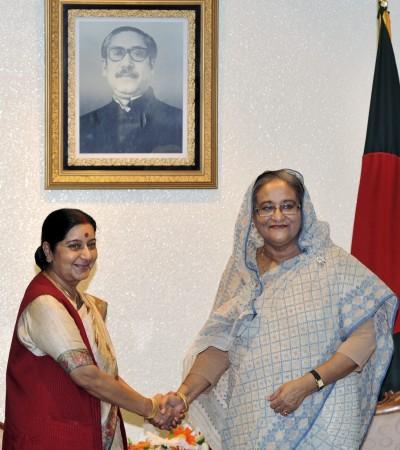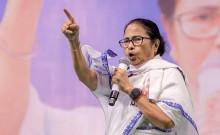
Indian minister Sushma Swaraj, on a three-day visit to Bangladesh announced an extension in the time limit of multiple entry visas and handed over Indian PM Narendra Modi's invitation letter to Bangladeshi Prime Minister Sheikh Hasina .
During her meeting with Bangladeshi Prime Minister Sheikh Hasina, President Abdul Hamid and External Affairs Minister A.H. Mahmood Ali on Thursday, External Affairs Minister Swaraj put across the Indian government's proposal to relax visa restrictions on its neighbours.
The multiple entry visas for minor and senior citizens have been extended from one year to five years.
"The external affairs minister has today conveyed the decision of the government of India that Bangladeshi nationals below 13 and above 65 years of age will be eligible for five-year multiple entry visas as against the current practice of multiple entry for one year," Business Standard quoted Indian external affairs ministry spokesman Syed Akbaruddin.
However, visa free entry and visas on arrival for Bangladeshi nationals were not among the original topics of discussion for both nations.
During her meeting with Hasina at her office yesterday, Swaraj handed over Prime Minister Narendra Modi's letter, which was, sent in response to the congratulatory note he received from her during his swearing in .
Accepting Hasina's invitation to Bangladesh, Modi invited her to visit India sometime soon. He also expressed his government's willingness to work together with India's close neighbours "to foster a new era of cooperation and connectivity across the South Asian region."
"Bangladesh is not merely a neighbour, but a nation with which we share history, culture, civilisation, and enduring links between people My government will apply itself to further accelerating our engagement and strengthening the framework of our relationships," Economic Times quoted Modi.
The other issues discussed
India-Bangladesh also discussed the Land Border Agreement (LBA) and water sharing dispute concerning the river, Teesta.
LBA, which was signed in 2011 by the UPA government, is said to have used for smuggling of food, livestock and drugs from India to Bangladesh and illegal immigration of Bangladeshis to India. Swaraj told the other side that the agreement is under perusal before the Parliamentary Committee.
However, about the water- sharing issues concerning the Teesta , Swaraj told her counterpart that the Indian government is trying to build a national consensus so that the treaty could be signed between the nations. Earlier in 2011, UPA government had promised to settle this issue.
Swaraj conveyed that India has agreed to supplying additional 100 MW power from the Palatana project in Tripura to Bangladesh. India in an another offer has proposed to increase the frequency of the Dhaka-Kolkata Maitree Express and extended a proposal to start a bus service along the Dhaka-Shillong-Guwahati route.
The two sides discussed many bilateral issues concerning both nations . However, the discussion was mainly focused on illegal incidents happening at the India-Bangladesh border .
"We will walk the extra mile to create opportunities and to build virtuous cycles of prosperity in the region. We will pursue the goal of economic integration and inter connectiveness through trade, investment, transportation, capacity building, environment-friendly practices and means that promote equitable development in the region," BS quoted Swaraj.
Swaraj, who reached Bangladesh late on Wednesday night, will meet Bangladesh National Party's Khaleda Zia and Jatiya Party leader Roshan Ershad on Friday, the last day of her visit. She has also extended an invitation to Mahmood Ali to India for the joint consultative commission, according to Financial Express.

















